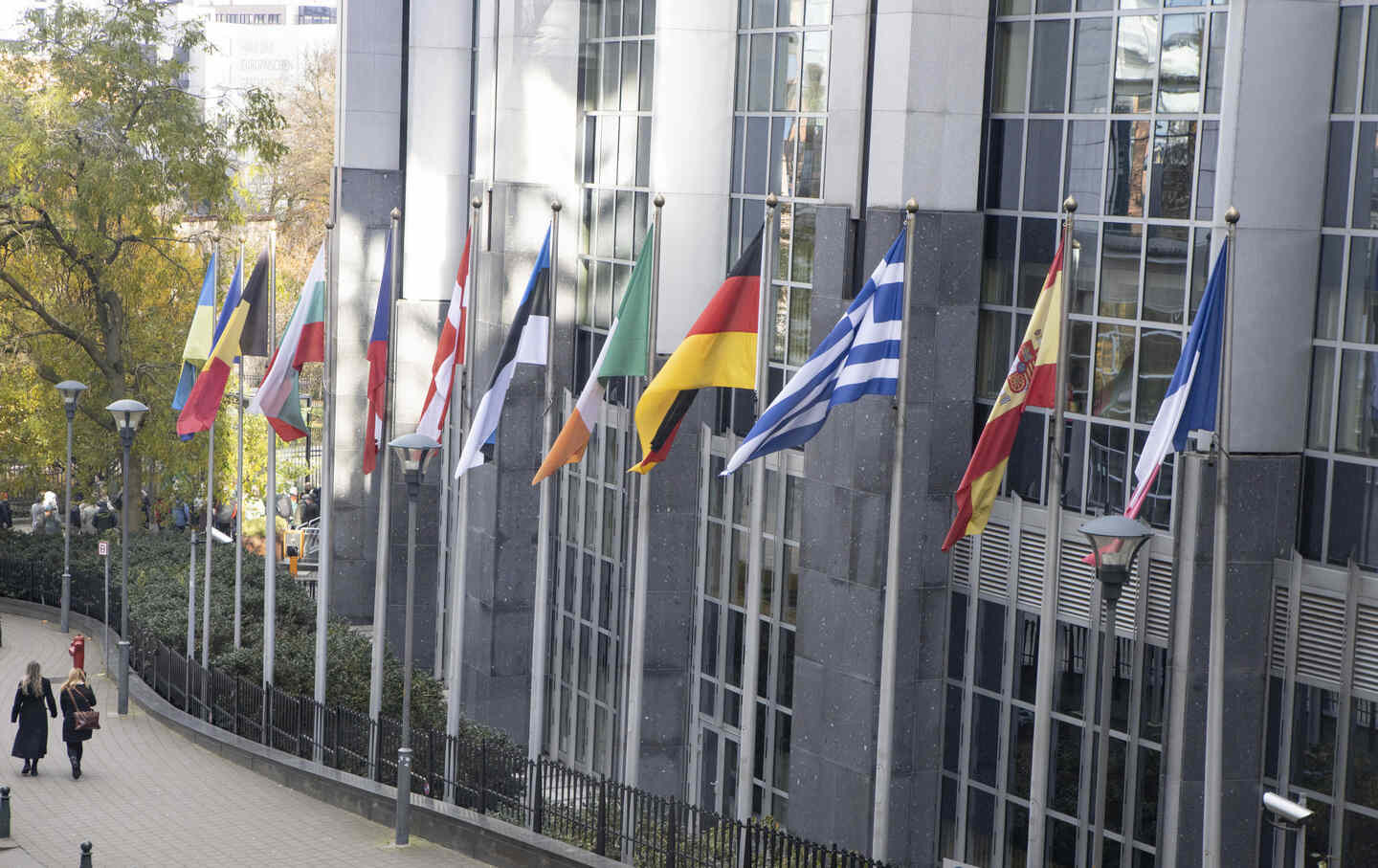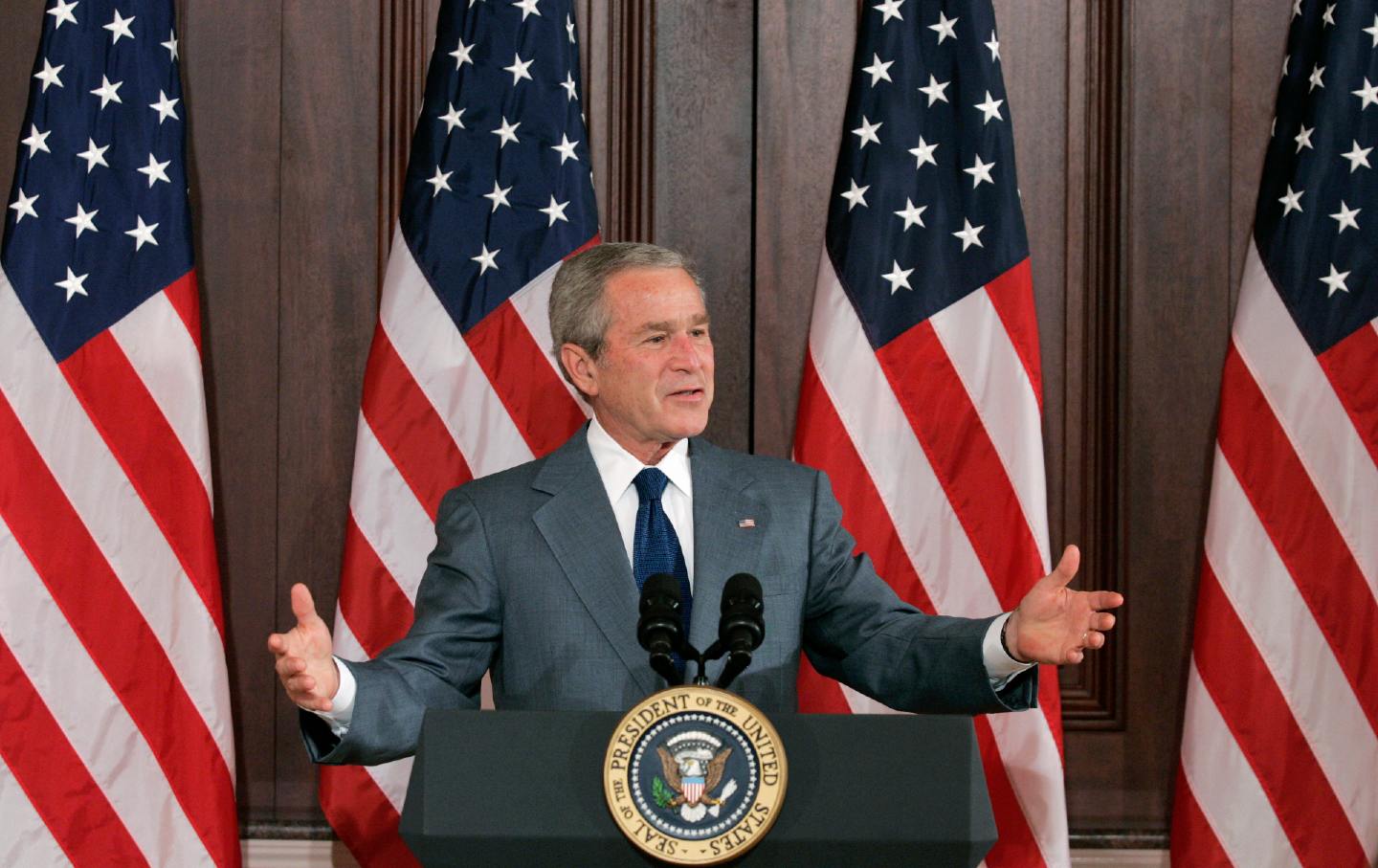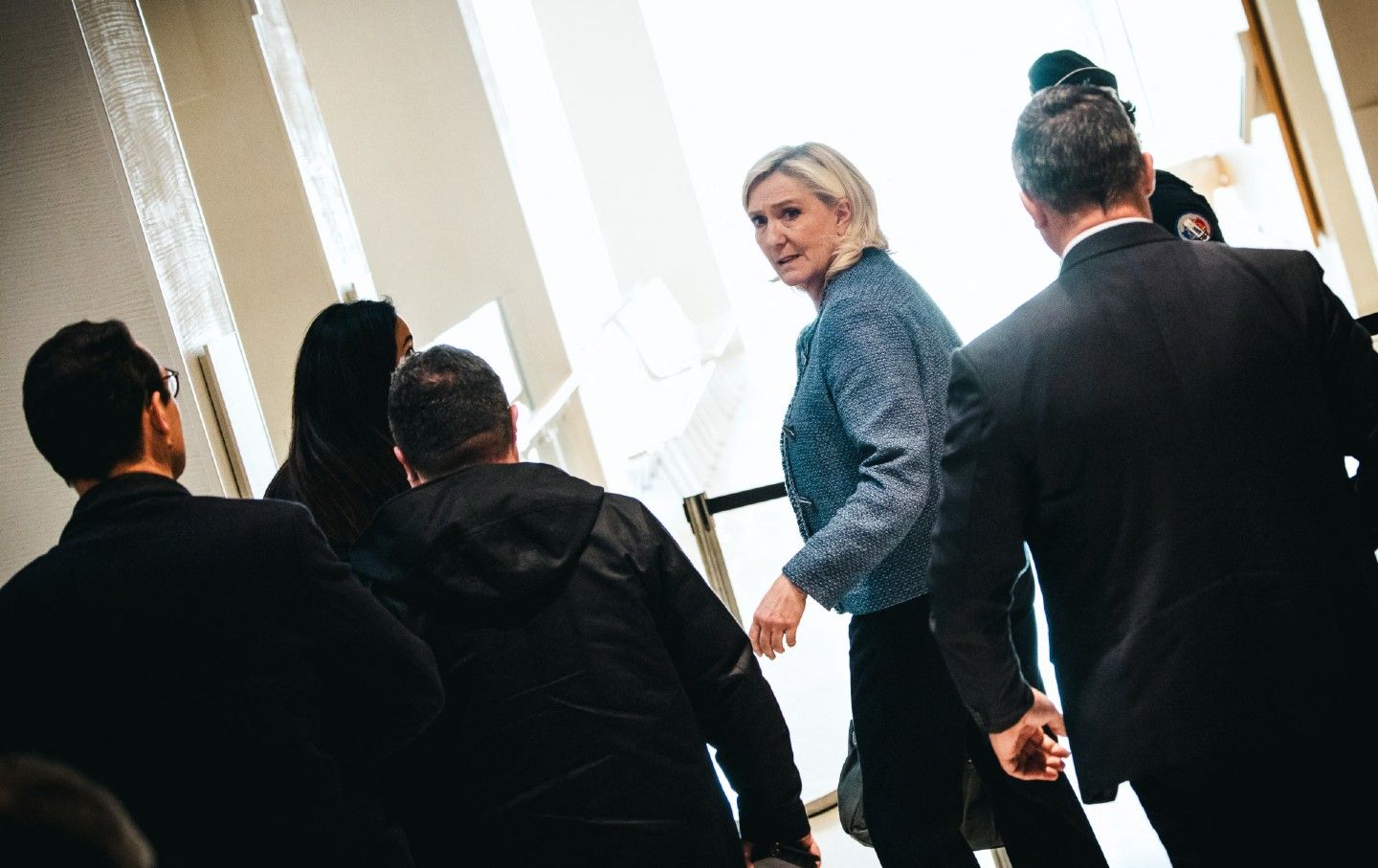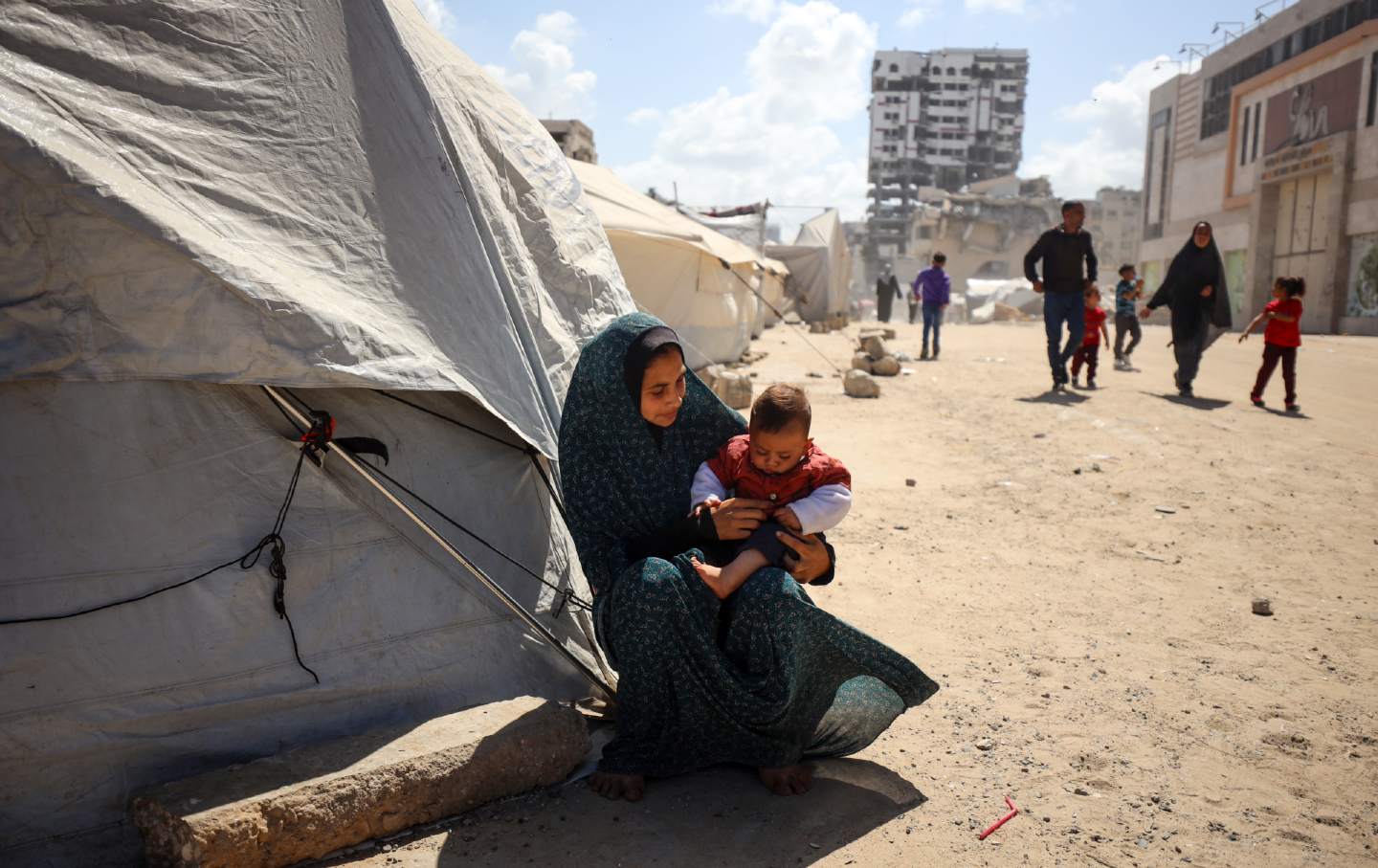It’s Time to Stop Ignoring the Sexual Violence Happening in Gaza
As long as our outrage is selectively assigned only to specific victims in specific contexts, we are lying to ourselves about the reality of violence in war zones.
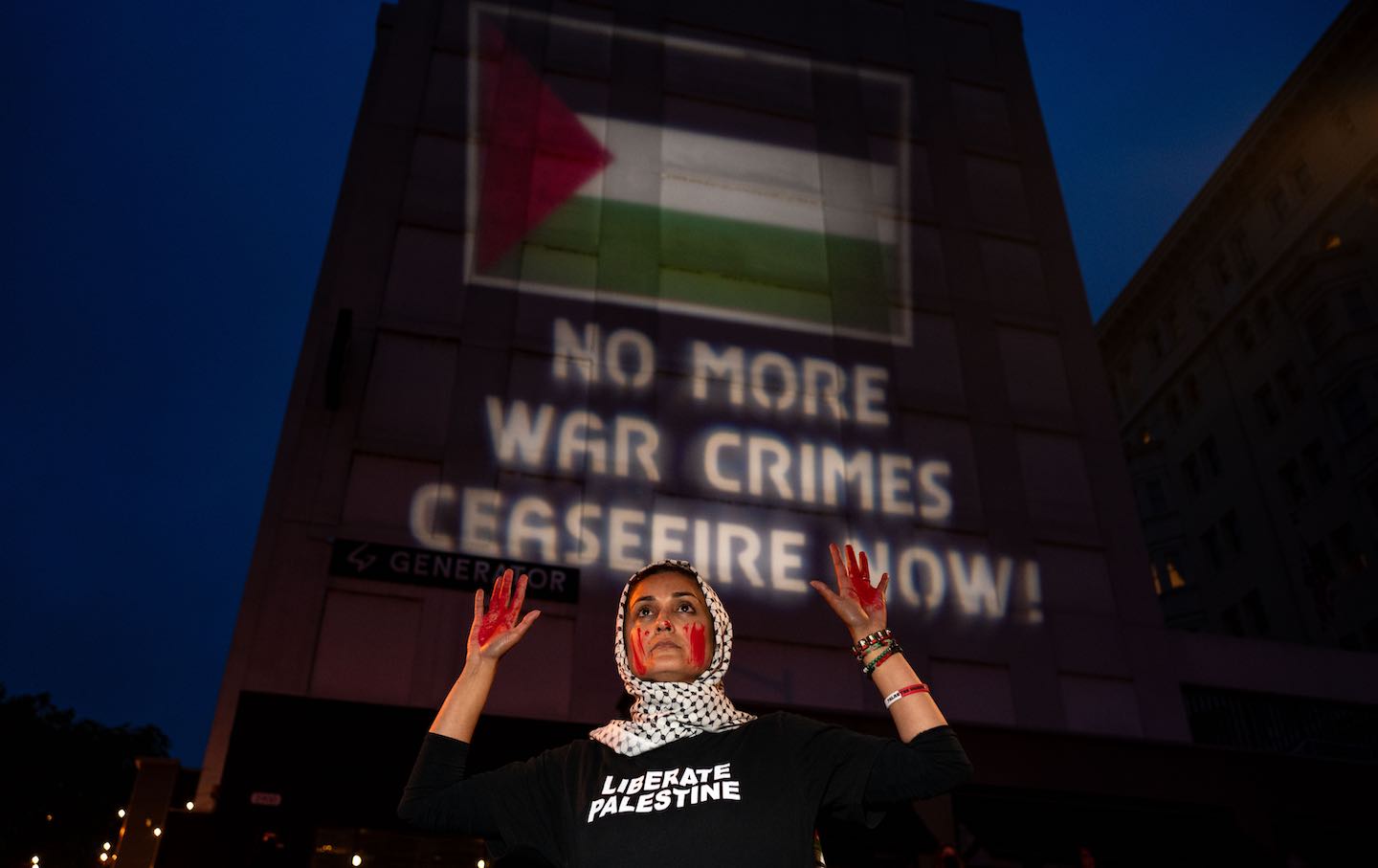
Pro-Palestinian demonstrators protest outside of the Washington Hilton, the site of the Annual White House Correspondents Dinner, on April 27, 2024 in Washington, DC.
(Photo by Kent Nishimura / Getty Images)
On April 26, Kastina Communications, a Tel Aviv-based production company, released Screams Before Silence, a documentary that aims to shed light on the sexual violence that occurred during the October 7 Hamas assault in Israel. The documentary, which premiered at the Times Center on April 25 and is available to watch online, opens to disembodied voices recalling the brutal scenes of October 7: naked bodies, bloodied pants, and terrified girls forcibly being taken hostage. Throughout the documentary, host Sheryl Sandberg, the former COO of Meta, presses her subjects on two key questions: were the rapes systematically planned? And did Hamas use rape as a weapon of war?
The answers are embedded in the questions, but Screams Before Silence has a parallel thesis: that the victims of the sexual violence were silenced not only as a result of their brutal murder but also by the world. Sandberg spent four days in Israel interviewing released hostages, Israeli police officers, and members of ZAKA, a controversial search-and-rescue organization, and survivors from the Nova Music Festival, all who provided testimony to what they witnessed or experienced firsthand. In a pivotal moment, security footage shows Hamas fighters admitting to raping women. So why, Sandberg asks, is the international community not paying attention?
It’s not an entirely impartial question, since mainstream media has paid outsized attention to allegations of Hamas-perpetrated sexual violence, and Israeli leadership has weaponized unreliable reporting to justify their military incursion into Gaza. Still, although there are serious shortcomings underpinning Sandberg’s reporting—for example, some of the sources Sandberg uses have been discredited or discounted by human rights experts—any survivor of sexual violence should be taken seriously, and their stories deserve to be told with respect and dignity. But if we can agree that these stories are important, we should also agree that telling everyone’s story is important. And a glaring omission in this documentary, as well as the broader conversation about the sexual violence, is that there is ongoing sexual and gender-based violence happening in Gaza. As Israeli survivors receive some international attention, there seems to be even less attention and desire to highlight the violence endured by Gazans.
Although mainstream media outlets have practically ignored the realities of Gazan women, major international human rights bodies have been keeping track. As of April 16, over 10,000 women have been killed in Gaza, leaving approximately 19,000 children orphaned, UN Women reported on April 16. In testimonies documented by Euro-Med Human Rights Monitor, dozens of women Palestinian detainees from Gaza report being subjected to verbal and sexual harassment, violence, torture, strip searches, and rape threats while unlawfully arrested and held by the Israeli military.
Since Israel launched its war on Gaza, Gazan men and women have provided extensive testimony as to the nature of sexual assault perpetrated by the Israeli military. And although gendered violence pervaded everyday life for Palestinians in both the West Bank and Gaza prior to the current ongoing assault, feminists who rally around the reports of rape of Israeli women, like Sheryl Sandberg and Hillary Clinton, have not lent Palestinian women the same level of concern.
Is it the pervasiveness of violence perpetrated against Palestinians that numbs Western audiences to it? Often, Palestinian suffering is deemed as unfortunate but necessary collateral damage in the pursuit for Jewish safety.
The journalist Peter Beinart describes this as anti-Palestinian bigotry, which is often overlooked “not because anti-Palestinian bigotry is rare but because it is ubiquitous.” The ubiquity of Western audiences writing off Palestinian concerns also desensitizes them to the everyday reality of violence, whether encountering harassment at checkpoints in the West Bank or the epidemic of malnourishment in Gaza.
Although Gazan women have given testimony to sexual violence perpetrated by Israeli soldiers, gender-based violence is also much broader and more manifold than this. Israel’s military assault and its subsequent manufacturing of a mass humanitarian crisis in Gaza has resulted in wide-scale violence that disproportionately affects women.
When Israel bombs Gaza’s hospitals—leaving them decimated or barely functioning—medical care comes to a standstill, affecting the 60,000 people who are pregnant, and the 180 who give birth daily without anesthesia or sterilization, leading to extremely dangerous births with high rates of miscarriage, stillbirths, and other medical complications. The blockade and obstruction of delivering humanitarian aid not only deprives medical providers of water, fuel, and electricity, but prohibits breastfeeding mothers from sufficiently feeding their babies. In Gaza, over half the women who are pregnant are anemic, which can lead to complicated pregnancies and an increase of developmental delays in children. UNICEF reported that anxiety caused by living under assault is causing many women to go into labor early and reducing their newborns’ chances of survival. The 700,000 menstruators in Gaza face “nightmare” circumstances in UNRWA shelters, where there is only one toilet per 486 people. The lack of menstrual health products and running water leads to an increase in risk of urinary tract infections or worse.
But the problem of overlooking other forms of gender-based violence is not new. Legal scholar Karen Engle argues in her 2020 book The Grip of Sexual Violence in Conflict, that the western feminist commitment to flagging sexual violence when it first entered the international arena during the International Criminal Tribunal for the former Yugoslavia (ICTY) came at the cost of feminist demands of women in the Global South, whose focus was economic distribution. While the success of western feminists in international arenas got sexual violence visible in the public sphere, it also functioned to submerge other gendered forms of violence.
The establishment of rape as an indictable war crime also provided the groundwork for intervening militarily on the basis of gender-based crimes. Israeli government officials and spokespeople regularly wield rhetoric that imply that the fight against Hamas is synonymous with the fight for women’s freedom. But weaponizing rape to justify military intervention also is not unique to the case of Israel and Palestine. As the anthropologist Lila Abu-Lughod argues in her 2013 opus Do Muslim Women Need Saving, the monolithic oppression of Afghan Muslim women served as a rhetorical device by American leadership to justify their military campaign. And similarly, NATO’s 2011 war in Libya, which resulted in mass civilian deaths, was carried out in the pursuit of protecting civilians—specifically triggered by reports of mass rape. In a recent conversation, Abu-Lughod told me that the fixation on rape “cheapens feminist arguments against sexual violence if the charges are sensationalized and weaponized for political agendas, and meant to distract and silence criticism of a truly brutal assault.”
Ultimately, the litmus test of rape as the signifier of sexual violence creates a false container for the reality of gender-based violence in war zones. Gender-based violence encompasses rape, but it is not limited to it. And what we’re witnessing in Gaza transcends rape and gender.
Popular
“swipe left below to view more authors”Swipe →The Israeli military’s policy that any Gazan man who is of “military age” is a suspected terrorist and therefore a tenable subject of torture has led to a carte blanche approach to arbitrary arrest and degradation. In December, the BBC verified footage circulating on social media of dozens of Palestinian men stripped to their underwear, kneeling on the ground, handcuffed and blindfolded. One journalist who was detained, Diaa Al-Kahlout, described to the Committee to Protect Journalists the psychological and physical torture he endured in Israeli prison until being released 33 days later.
Sexualized violence appears not just in Israeli prisons, but also in the homes of Gazans. A recent trend among young Israeli soldiers is to post photos of themselves with Gazan women’s lingerie on social media or on their dating profiles. As photojournalist Nina Berman notes, these images implicitly speak to the violation of intimate space in Gaza, and the erasure of the women “who loved and cared for each other and shared private moments and pleasures.” In one image, an Israeli soldier poses with white high heels, which he took from a Palestinian woman and plans to bring back to his girlfriend. It’s a chilling image, and one that feels microcosmic of the ultimate power imbalance at play.
Rape is a horrifying reality of war and conflict, and both Israeli and Gazan survivors deserve their testimonies to be heard and metabolized by accountable parties. But as long as our outrage is selectively assigned only to specific victims in specific contexts, we are lying to ourselves about the reaches of violence, and the way it reverberates and haunts peoples’ lives in layered, corrosive ways.

